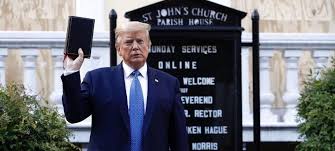Readings for the 4th Sunday of Advent: 2 Samuel 7: 1-5, 8B-12, 14A, 16; Psalms 89: 2-5, 27, 29; Romans 16: 25-27; Luke 1: 38
In terms of teaching theology and elucidating the Bible, I'm happy for our nation's experience of Donald Trump. Otherwise, not so much.
The reason for my contentment is Mr. Trump's blatant exploitation of religion and his ability to persuade so many people of faith that he is a man of God. Think of his now infamous Bible posing in front of DC's St. John's Church after having police clear the area of Black Lives Matter protesters.
The event clearly illustrated a perennial religious dynamic that is essential for critical thinkers to understand. I'm referring to what Chilean scripture scholar, Pablo Richard, calls the "battle of the gods."
The Battle of the Gods
The combat in question pits the God of the rich against the God of the poor. Specific to our readings on this fourth Sunday of Advent, it sets the God of Moses against the God of King David's crime family. Yes, his crime family.
To begin with, the God of the poor set free a motley group of slaves from Egypt and instituted Moses' order that favored them rather than their Egyptian slavers. Its "preferential option" prioritized the interests of widows, orphans, and resident non-Hebrews living in Israel. Covenant law eventually forgave the debts of impoverished Hebrews every fifty years. In the process, it disadvantaged landlords and bankers. It made no provision for reestablishing the royal class that had made the lives of slaves so miserable in Egyptian captivity.
Then about a thousand years before the birth of Yeshua, all of that changed. Israel's upper classes decided to reinstitute an order reminiscent of Egypt. It had the rich lording power over the poor, taxing them heavily, instituting forced labor, and sending Israel's young men to fight and die in gratuitous wars of conquest as conscripts in a standing army.
Saul was Israel's first king. He was succeeded by King David and then by his son, Solomon. Both father and son were ruthless womanizers committed to increasing their own wealth and power at the expense of the poor. Theirs was truly a crime family masquerading as God's beloved appointees.
Family dysfunctions included internecine murders and wars, incestuous rape (2nd Samuel 13) and lasting vendettas. David's deathbed will and testament was worthy of any Mafia don (I Kings 2: 2-12). However, to achieve the power for which they thirsted, both David and Solomon had to convince their subjects that they were indeed men of God.
That called for fabricated visions and assurances from the divine. Both David and Solomon assisted by their court prophets and scribes enthusiastically obliged. And so, David made sure it was recorded that he was a man "after God's own heart" (I Samuel 13:14). Meanwhile, Solomon's own court historians portrayed him as the wisest man who ever lived (I Kings 3: 11-15).
Central to the ruse was a reframing of Moses' Sinai Covenant to favor the newly emergent royalty and their hangers-on rather than the poor. That's what we find in this Sunday's first reading from 2nd Samuel. There, David and his court prophet, Nathan, conspire to change the beneficiaries of the Mosaic Covenant from the poor and oppressed to the royals. In this way, the covenant becomes not a divine promise to protect widows and orphans, but to assure a lasting dynasty for David's crime family. Put otherwise, the Covenant of Moses was replaced by the Covenant of David.
The great prophets of Judah and Israel rebelled against such palace distortions of faith.
Some tried to work within the new system holding kings' feet to the fire, reminding them of their obligations towards the weak and vulnerable. Others gave up on the royals and called them out for their self-serving cruelty and corruption.
The great prophets celebrated during this advent season, John the Baptist and his disciple Yeshua of Nazareth, fell into the latter category. They had no use for the royals, the temple priests, their lawyers and apologists. They reserved special abhorrence for their country's Roman occupiers.
(Note: You can view every article as one long page if you sign up as an Advocate Member, or higher).






